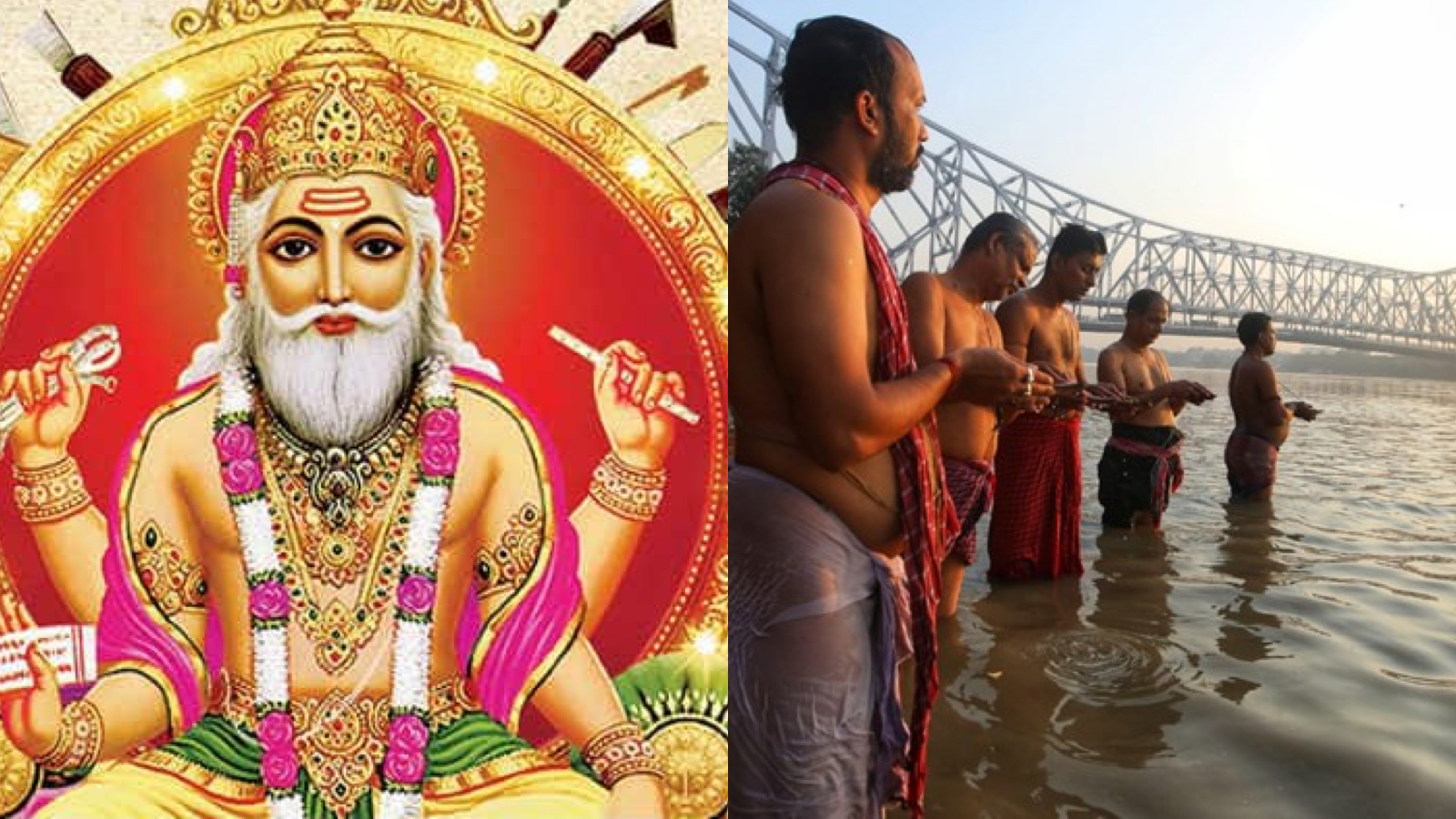Mahālayā and Viśvakarmā Pūjā hold a special significance in our sacred traditions of honouring ancestors.
By Sreejit Datta, Assistant Professor, Director of Civilisational Studies Practice & Resident Mentor at Rashtram.
Image Sources: India.com & Indian Express.
Today is a special day in more than one way. Firstly, today marks the sacred occasion of Mahālayā, also known as Mahālayā Amāvasyā or Pitṛ Amāvasyā. Being the final day of the Pitṛ Pakṣa, it is considered to be a very special occasion in the life of the Indic people. In his encyclopaedic treatise Bharatkosh, Pandit Chintaharan Chakraborty has described the day as ‘the very foundation of celebrating one’s ancestors’. The etymology of the word Mahālayā is ‘mahat ālaya’ – meaning, the great abode. According to the sacred tradition, this day marks the culmination of a fortnight known as Pitṛ Pakṣa, during which the departed ancestors come down to the mortal plane from their abode the non-physical realms of existence, with the hope of partaking in the humble offerings of water and piṇḍa, i.e. a ball of rice, from the hands of their living progeny. These offerings are made to propitiate the departed soul of the ancestors usually at the bank of a sacred river, like the Gaṅgā or Kāverī, in the early hours of the day, accompanied by sacred chanting of mantra-s. This solemn act of offering is known as Pitṛ Tarpaṇa, or simply as Tarpaṇa.
In this context, Pandit Satinath Panchatirtha writes: “The Tarpaṇa performed on the day of Mahālayā is not only limited to propitiating one’s ancestors. The entire ritual consists of Deva Tarpaṇa (propitiation of the gods), Ṛṣi Tarpaṇa (propitiation of the sages), Bhīṣma Tarpaṇa (propitiation of Bhīṣma – since the grandsire of the Kurus of Mahabharata had no offspring of his own due to his vow of celibacy) etc. Then there are propitiatory offerings made to Sri Rama and Lakshmana as part of the same ritual. The ritual prescribes the propitiation of all departed souls from the three worlds through an offering of water. Tarpaṇa is offered to even those who, across their multiple births, have been bereft of family and friends.” It is because of this act of propitiating the departed beings of the entire universe – regardless of whether they be one’s kin or not, whether they be known or unknown to the performer of the rite – that this day is considered to be a highly auspicious one.
Pandit Haraprasad Shastri, the great scholar from Bengal, who has been a President of the Asiatic Society, Calcutta and a member of the Royal Asiatic Society, London, has dubbed the day of Mahālayā as the most favourable occasion for a father to bless his child. Every year on this occasion, Bengali Hindus ritually tune in the radio to listen to the early morning broadcast of the legendary Mahishasuramardini radio programme produced by AIR Akashvani Kolkata, which started in 1935 and continues to be a hit till date. It is only after the ninety-minutes long programme is over that they flock to the ghats of the Gaṅgā to perform their Tarpaṇa. It is a unique phenomenon, in the sense that it has emerged as something of a modern-day making of sacred ritual for an Indic community anywhere in the world. The evocative vocal performance led by Sri Birendra Krishna Bhadra, whose chanting of the Devī Māhātmyam (also known as Śrī Śrī Chaṇḍi) has become a legend, signals the approach of the greatest festival in the Bengali life – Durgā Pūjā.
Today owes its speciality and sacredness also to the occasion of the Viśvakarmā Pūjā. Viśvakarmā is the Hindu Vedic god of engineering and craftsmanship. Viśvakarmā is the four-armed cosmic architect, whose mount is the elephant, and he always carries the tools of the craftsman and the engineer in his four hands. Craftsmen, engineers, architects – indeed any creator who uses his labour, imagination, and mechanical tools – decorate their workshop on this occasion in the fashion of a temple, and they worship the god of craftsmanship, along with the tools and machines of their respective crafts, inside the workshop-cum-temple throughout this auspicious day. In various parts of India, the Viśvakarmā Pūjā celebrations are also accompanied by a unique and exciting sport, that of kite fighting.

